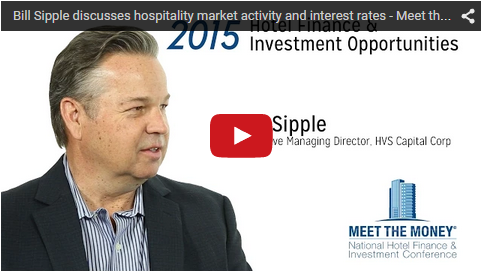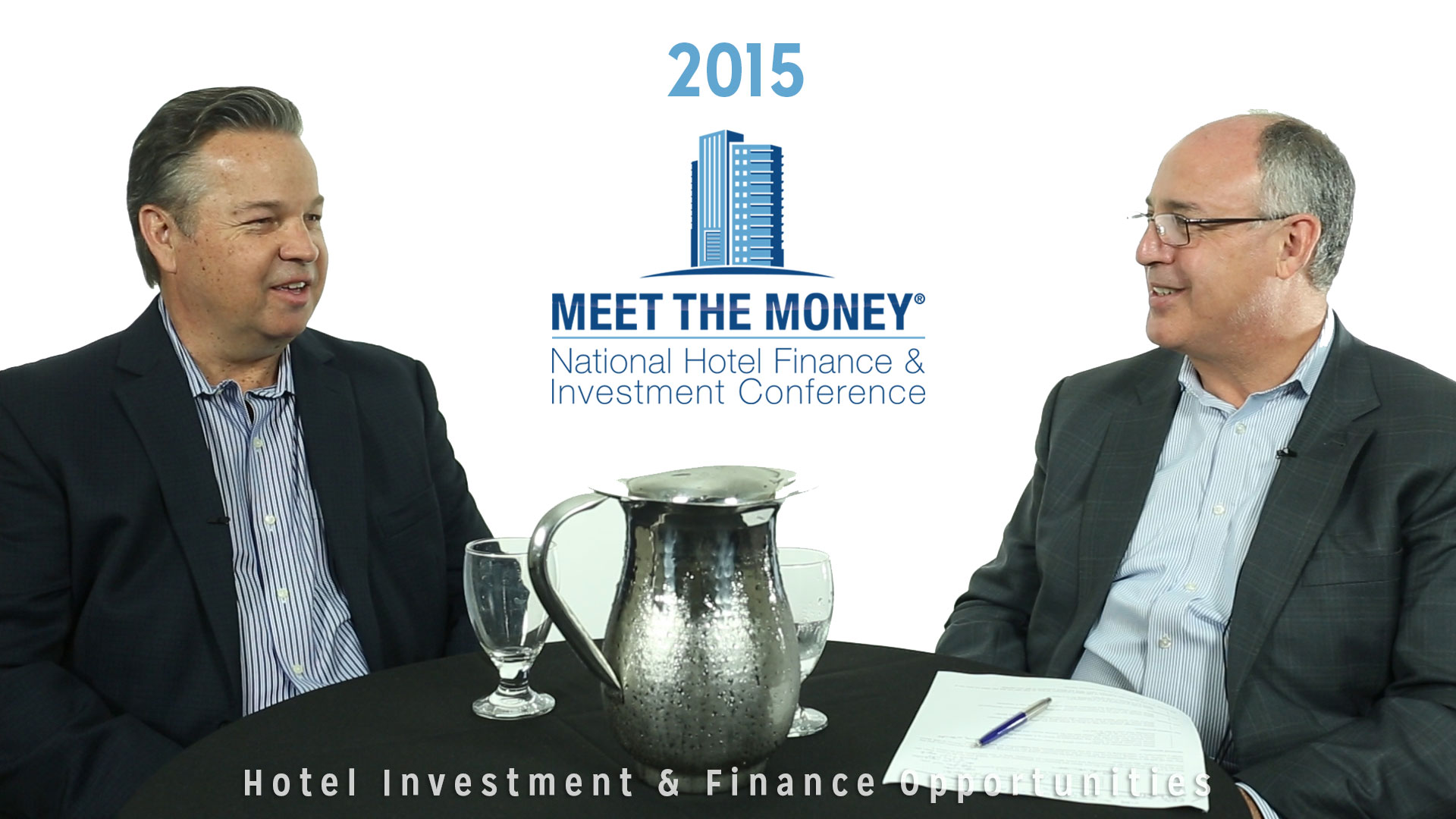24 June 2015
Bill Sipple, Executive Managing Director of HVS Capital, speaks in the video below about activity in different markets, limited service properties, and whether rising interest rates will have an effect on transactional activity.
Bill sat down with Bob Braun, a senior partner in the JMBM Global Hospitality Group®, as part of our video interview series on hotel finance and investment opportunities in 2015.
A transcript follows the video.
Bob Braun: Hi, I’m Bob Braun. I am a Partner at Jeffer Mangels Butler & Mitchell. I’m here at Meet the Money® 2015, our 25th anniversary. I’m here with Bill Sipple, who is the Executive Managing Director of HVS Capital. Bill, thanks for coming by and talking with us.
Bill Sipple: It’s good to be here, thanks.
Bob Braun: Bill, I wanted to start out by asking you: what kind of opportunities do you guys see out in the marketplace, and what are you doing about those? How are you trying to take advantage of those?
Bill Sipple: Well, HVS Capital is the investment banking arm for HVS International, for the Americas and the Caribbean. So we do three things: we do debt and equity placement, we do asset sales, and then we do what I call capital advisory work. So, in bad times that will be things like loan workouts and loan modification, and in good times it will be franchise searches and that sort of thing. So from an opportunity standpoint, we’re really transaction oriented. I think there are–today’s opportunities on the capital market side of the business are really the ability to put long term, low cost, fixed-rate financing on assets that you either intend to sell in the short term to provide an accretive part of the transaction, or assets that you plan on keeping for a longer period of time. So from a financing perspective there’s really good, cheap, long-term debt for stabilized properties. Secondly, from the standpoint of asset transactions, I think we’ve still got enough runway in this particular market to where you could sell an asset today, or buy an asset today, and still have time enough within the cycle to be able to capitalize on the transaction as you would execute today.
Bob Braun: That’s great. Are there any particular market segments or chain scales that you are looking at as being particularly attractive now?
Bill Sipple: We’ve been seeing–in this particular cycle–an awful lot of activity in the better segment, better part of the limited service or select service segment, I should say. So the top three or four brands–their select service products have been pretty popular in both primary and secondary markets. We’re starting to see some more interest in tertiary markets because of the competition in the primary and secondary markets. So I think there’s been a lot of opportunity in those. Full service properties have had moderate activity and interest level from the standpoint of institutional buyers, and then you’ve also had, I think, very good rebound over this particular cycle in the luxury segment, and you’re starting to see even more activity in luxury hotels.
Bob Braun: So it feels like it’s hitting on all cylinders, really.
Bill Sipple: Yeah, I think there’s only one product segment that hasn’t seen a tremendous amount of growth, and it’s at the lower end of the market.
Bob Braun: So the truly lower end limited service properties?
Bill Sipple: Right.
Bob Braun: And you mentioned–are you actively looking at what’s happening in the tertiary markets, or are your clients looking that, or..?
Bill Sipple: We’re financing in all–we actually have deals in all three markets, tertiary, secondary and primary markets at this time.
Bob Braun: Okay. Are you doing a lot of work in the Caribbean now, or in Latin America?
Bill Sipple: We have three engagements going on in the Caribbean right now. The Caribbean is an interesting aggregate. You know, if you aggregate the Caribbean, right? It’s generally the first market that falls off the table when the market turns, and it’s usually the last one to come back. There’s a tremendous amount of activity, and the activity in the Caribbean right now–and over the last, say twenty-four months–has really been busted projects that people are picking up and trying to complete from the last downturn.
Bob Braun: Interesting. I would imagine that one of the things that drives you and drives your business are going to be interest rates, and they’ve been awfully low for a long time. Where do you think they’re going and how do you think that’s going to impact your business or ability to execute on your plans?
Bill Sipple: Well, you know, interest rates and the prediction of interest rates is kind of like marketing dollars, like advertising dollars. We know half of all advertising dollars have an impact, we just don’t know which half. So that we know interest rates are going up, we just don’t know when.
Bob Braun: Right.
Bill Sipple: So, it’ll happen, probably this year. How much it goes up and how much it impacts the business and the transaction activity is yet to be seen. We know it will have an impact on cap rates and pricing, so there’s nobody doubting today that interest rates are going to see some increase. But I don’t think anyone is predicting a large increase, so I would expect it to have some nominal impact on transaction activity.
Bob Braun: Getting back to your comment on the really lower end properties. Do you think there are opportunities there because there just hasn’t been a lot of attention paid to them, or do you just think that’s an area that’s languishing on the vine for good reason?
Bill Sipple: Well, I don’t think any particular segment of the market is struggling. I think there’s been more interest in what I would call income efficient properties, which are the higher-end select service brands. There’s a lot of income efficiency in that segment of the market, and so there’s been a lot of interest and a lot less operational risk. You can actually have projects that get to the point where you can have critical mass in terms of the project size. We think in terms of how easy is it to put capital out into a project. If it has scale, then you have the attention a number of different capital sources. If it doesn’t have scale, then it’s very difficult to get the attention of capital sources.
Bob Braun: Right.
Bill Sipple: So the challenge that you have with the lower end properties is the scale of the investment is so small that it’s really a friends and family kind of an equity play–as opposed to an institutional equity play. So, in that case it’s harder to find interest, it’s harder to gain scale. The only way you can actually gain scale is through a portfolio acquisition like some of the ones that have happened.
Bob Braun: So I’ll ask you to do a little bit of prediction, since you opened up the question about the runway in the market. You could pretty make book on this in London as to how long this cycle is going to last. Do you have any feel for this? Is this a one- or two- or three-year runway? Or is this shorter?
Bill Sipple: Well I have my hopes and ambitions. And then I have reality to deal with. I think we’re–in baseball terms–probably in the 7th inning. I think we’ve got somewhere between 18 and 24 months would be my guess, in terms of additional runway. But we’ve been saying that for the last 12 to 14 months…
Bob Braun: Right.
Bill Sipple: …right? That we have another 24 months.
Bob Braun: And that happened on the other end. There was only another 12 to 18 months before there was a turnaround, and that 12 to 18 months just lasted forever.
Bill Sipple: Well it’s interesting. There are three reasons why a market turns. Either you have an economic downturn–we haven’t had a huge economic upturn, so I don’t know how we would have a huge economic downturn. You have an oversupply situation–we haven’t had a lot of supply being built. It’s been relatively measured. And I know we’re starting to see some now and we’re going to see some now and [20]17. Or you have some type of an external event which you can’t really plan for. And there’s been great capital availability and low interest rates.
Bob Braun: Right.
Bill Sipple: So, from that standpoint, which one of those is going to change? We kind of know what the supply is going to look like. We don’t know what an external event would look like.
Bob Braun: Right.
Bill Sipple: And we really can’t predict the economy these days. So, I think we could have another five years–but I don’t think we do.
Bob Braun: As much as we’d like it.
Bill Sipple: As much as I’d love it.
Bob Braun: Well Bill, it’s been a pleasure. Really appreciate your taking the time away from the conference, and I hope you enjoy the rest of it.
Bill Sipple: Absolutely, thank you, appreciate it.
Bob Braun: Thanks very much.
Our Perspective. We represent hotel owners, developers and investors. We have helped our clients find business and legal solutions for more than $125 billion of hotel transactions, involving more than 4,700 properties all over the world. For more information, please contact Jim Butler at jbutler@jmbm.com or +1 (310) 201-3526.
Jim Butler is a founding partner of JMBM, and Chairman of its Global Hospitality Group® and Chinese Investment Group®. Jim is one of the top hospitality attorneys in the world. GOOGLE “hotel lawyer” and you will see why. Jim and his team are more than “just” great hotel lawyers. They are also hospitality consultants and business advisors. They are deal makers. They can help find the right operator or capital provider. They know who to call and how to reach them.





